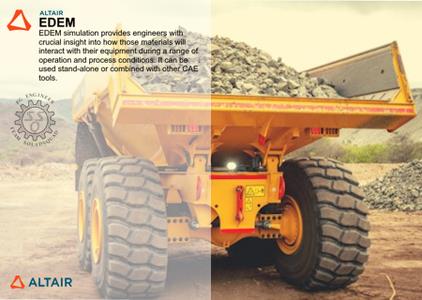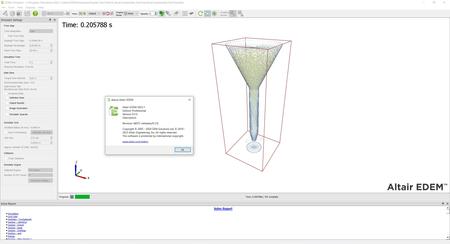
Free Download Altair EDEM Professional 2023.1 | 1.2 Gb
Altair, a global technology company providing solutions in product development, high-performance computing and data analytics, is pleased to announce the availability of Altair EDEM Professional 2023.1, the market leading Discrete Element Method (DEM) software for bulk and granular material simulation.
Owner:Altair
Product Name:EDEM
Version:2023.1 Professional
Supported Architectures:x64
Website Home Page :www.altairhyperworks.com
Languages Supported:english
System Requirements:Windows *
Size:1.2 Gb
Altair EDEM Professional 2023.1 Release Notes
Key Features
Image Export during runtime
Users can now export images from EDEM during the simulation. This can be done using the GUI or from the command line. Exported images match the scenes from EDEM Simulator, and they can be exported at user-specified time intervals. Users can use this functionality to monitor the progress of simulations during runtime and generate visuals of simulations without needing to save the data. Note that when running on a headless Linux node, XVFB is a pre-requisite.
Continuum Analysis Improvements
Continuum Analysis continues to expand within EDEM, and this release adds the following capabilities:
– Concentration – See the variation in concentration for each Particle Type across the simulation domain.
– EDEM Custom Property Data – Any custom property data which has been generated via EDEM API Models can also now be displayed, greatly enhancing analysis and visualization methods when working with advanced physics models.
– Specify Continuum Analysis per Particle Type – Continuum Analysis has been updated to enable each parameter to be filtered by Particle Type
– Import Geometry for Continuum Analysis Mesh – CAD Files can be imported and used to generate meshes for the Continuum Analysis to be displayed on. This allows the analysis to be aligned to your equipment and offers greater freedom over the meshing density if required.
Recorded Factories
The option to use the output of a simulation as an input for the next simulation has been added to EDEM. This functionality allows users to add a region to one simulation which records the material flowing through it for use in other simulations. Users can then add a recorded factory to a new simulation. This factory uses the recording from the first simulation to generate particles. Recording can be set to loop and have Start and End times.
Hydrodynamic Lubrication plugin Contact Model
A Hydrodynamic Lubrication contact model has been added to the EDEM plugin contact models. The Hydrodynamic Lubrication Model simulates the effect of short- range hydrodynamic forces on particles as though they were saturated in a fluid. The model may be used for both particle-particle and particle-geometry contacts, with the assumption that the system is fully saturated, and no fluid free-surface is involved. It is important to note that the model does not explicitly model the fluid, but it impacts particle behavior. The model is most useful when modeling dense granular suspensions, where shear and extensional flow effects are important, but it might be applied to simulate any saturated system where short-range hydrodynamic forces are important. Because the model’s intended application is for small particles (e.g. millimeter or micron sized), it may be less relevant to large particles (e.g. rocks), though the model’s applicability limits are currently unclear.
Simulator
Warning message when a contact radius has not been defined when bonding contact model is used
A warning will be displayed if the bonding v2 model is assigned, but the particles to be used with this model do not have a valid contact radius assigned.
Specify percentage of Rayleigh Time Step used with Auto-Time Step
It is now possible to set a preferred percentage to apply when Auto Time Step is enabled, rather than the default value of 20% of the Rayleigh Time Step. EDEM will automatically adjust the Rayleigh Time Step based on the smallest radius that is currently in the simulation, rather than the smallest radius to be created.
Coupling
Update RecurDyn-EDEM coupling to use data flags
The speed performance of the Recurdyn coupling has been improved. This has been achieved by only sharing the data required by Recurdyn during the simulation.
Remove Abaqus Coupling
Access to the Abaqus coupling has been removed from EDEM.
EDEMpy
EDEMpy Version 1.4.0
EDEMpy Version 1.4.0 contains the following updates:
EDEMpy: Setting unlimited factory generation
Options have been added to the EDEMpy factory setting function to define a factory with no limit to the number of particles produced.
Other
Restoring default settings
The Tools Options dialog box has been updated to include a ‘Defaults’ button for all tabs which returns all settings to their default values. The only exception is the Units tab, where the ‘Set All to SI’ button already provides this functionality.
Bugs
EDEM 2023.1 contains fixes for the following issues:
– Material and particle parameters were not removed from the Physics Model with the dialog boxes applied when the corresponding material or particle was deleted from the Creator tree.
– All models have been updated to use physical radii for all calculations, including the calculation of the contact point.
– The Legend options in Continuum analysis could cause the EDEM view window to freeze.
– When moving from EDEM Simulator or Analyst to the Creator with a particle already selected in the Creator panel, the Particle View toolbar did not display until another particle was selected.
– Some parameter values could go out of range when using the up or down arrows in the EDEM interface.
– An issue in continuum analysis could occur when an analysis plane was set up to exceeding the domain size, this would calculate an invalid number of nodes.
– A crash could occur when merging geometries which were using the block factory feature.
– Custom properties for modified particles were not being reset correctly when using an API or a material block.
– Copying a geometry did not copy the attached Material Block and Volume Packing options.
– Lists in the API custom user interface were hidden rather than grayed out when they were not populated.
– A crash could occur when closing the solver export options dialog box with the items still being modified.
– Default names for new factories were not being indexed correctly.
– Error messages were not showing up if invalid user-defined polyhedral particles are imported using EDEMpy
– The legend for fields did not allow negative numbers.
– When a particle was deleted, the incorrect contacts were removed from the contacts h5 file for the associated Time Step.
– Breakage post-processing export functionality did not allow relative paths to be used in the options.
– Contact Model parameters were not correctly checked when material blocks were added to the simulation.
– Particle temperature and other particle custom properties could be corrupted if another type of custom property (e.g. geometry) existed with the same name.
– CUDA Multi-GPU simulations would fail with around 750 million particles. The limit has now been extended to at least 1 billion particles.
– Contacts would not be detected between small geometries and small particles.
– The EDEMpy function for getting custom property values returned errors. Users can now access custom property data from the geometry ID, geometry name, or h5 index.
– Contacts could be detected in an incorrect position when using polyhedral
particles as components in meta-particles.
– A misleading error message, custom gpu_bad_alloc could be displayed when
the CUDA solver ran out of memory.
– A crash could occur during saving when using a meta-particle comprising a
large number of particles.
– An error message could be incorrectly when running a simulation containing
polyhedral particles with a size distribution and linear periodic boundaries.

EDEMis high-performance software for bulk and granular material simulation. Powered by state-of-the-art Discrete Element Modeling (DEM) technology, EDEM quickly and accurately simulates and analyzes the behavior of granular materials such as coal, mined ores, soils, fibers, grains, tablets, and powders. EDEM simulation provides engineers with crucial insight into how those materials will interact with their equipment during a range of operation and process conditions. EDEM is used for virtual testing of equipment that handles or processes bulk materials in the mining, equipment manufacturing and process industries. Companies worldwide use EDEM to optimize equipment design, increase productivity, reduce operational costs, shorten product development cycles and drive product innovation.
Altair EDEM 2023release is packed with amazing new capabilities and improvements. Central to this release is the ability to use different DEM particle shapes methods, including polyhedron, multi-spheres and sphero-cylinders, within the same simulation. This allows us to considerably expand the range and complexity of applications possible with our market-leading solution. Among the many new features included, we have new physics in the form of a more efficient and shape-agnostic bond model and extended analysis capability with a new residence time for user-defined regions. And, an enhanced API for custom models brings a more integrated experience, including a new GUI preference interface and data stored internally.
What’s New in Altair EDEM 2023 – Release Highlights
Altairis a global technology company that provides software and cloud solutions in the areas of product development, high performance computing (HPC) and data analytics. Altair enables organizations across broad industry segments to compete more effectively in a connected world while creating a more sustainable future.











Leave a Reply
You must be logged in to post a comment.